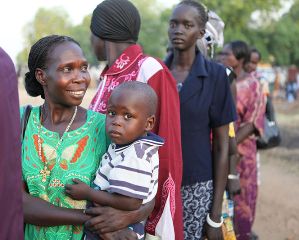South Sudan’s Borders Compromised by North
 |
| Sudanese wait in line to vote on referendum in January |
As South Sudan gears up to become Africa’s 54th nation, the region continues to face threats from north Sudan. On Tuesday the Government of South Sudan accused north Sudan’s government of deliberately closing all commercial routes to the south.
South Sudan will officially separate from Sudan on July 9 and become its own nation, after 98 percent of eligible voters voted in favor of a secession in a January referendum. Sudan, however, is still a country of people groups oppressed, marginalized and killed by their own government.
The border between the north and south are under threat Islamist regime in Khartoum, led by Sudanese President Omar al Bashir. Bashir, who is under indictment by the International Criminal Court for war crimes, has announced that Sudan will be a Sharia-ruled Islamic state after the separation of the south, and the indigenous cultures and languages of Sudan’s people will be eliminated.
“Khartoum is an egregious violator of human rights and has broken the covenants that it had made in the 2005 Comprehensive Peace Agreement,” says Faith McDonnell, director of Religious Liberty Programs and of the Church Alliance for a New Sudan at the Institute on Religion & Democracy.
United Nations spokseman Kouider Zerrouk told Bloomberg that 7,000 civilians are taking refuge near the UN compound in the capital of Southern Kordofan state, Kadugli, where there were heavy clashes Wednesday.
“The government in Khartoum is not happy to see people of South Sudan living in peace. It says one thing and does another. It is not sleeping. It is working day and night to sabotage peace and development in the area. It has adopted detrimental policies,” Stephen Dhieu Dau, minister of trade and industry in the Government of South Sudan told Sudan Tribune on Monday.
Zerrouck said the bodies of four policemen and two civilians were brought to the Kadugli police hospital after fighting Tuesday.
The conflicts have sparked concerns that the two-decade civil war, which ended in a peace agreement in 2005, may start up again.
“Currently Khartoum has 50,000 Sudan Armed Forces and 20,000 Popular Defense Force militiamen stationed in the Nuba Mountains and has threatened war,” McDonnell said. “Khartoum imposed another indicted war criminal, Ahmed Haroun, as Nuba Mountains governor, rigging the election to defeat the popular SPLM candidate, Commander Abdelaziz Adam al Hilu.”
Sudanese from Abyei, Nuba Mountains, Darfur, Beja land in Eastern Sudan, Blue Nile and the far north of Nubia, joined by Southern Sudanese and other concerned citizens will protest the atrocities being committed against the Sudanese people in a rally on Saturday, 1 p.m., at Freedom Plaza in Washington, D.C.




























































